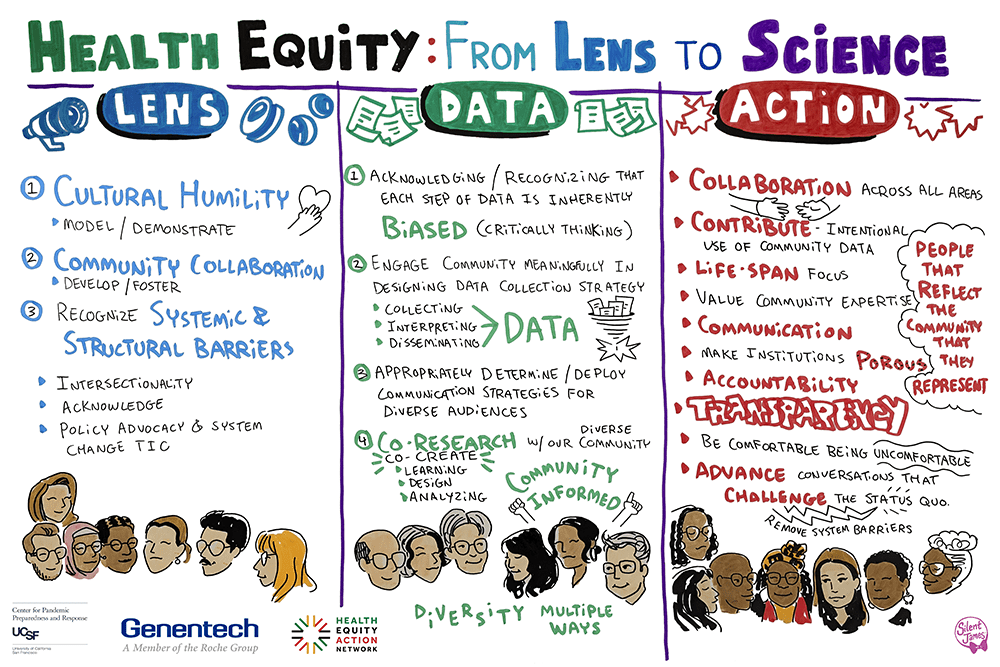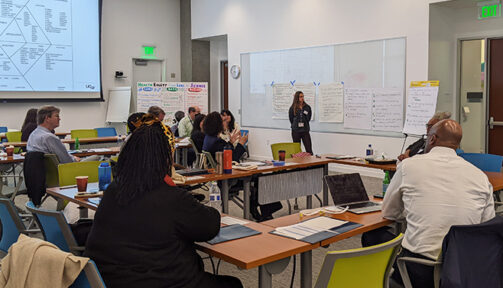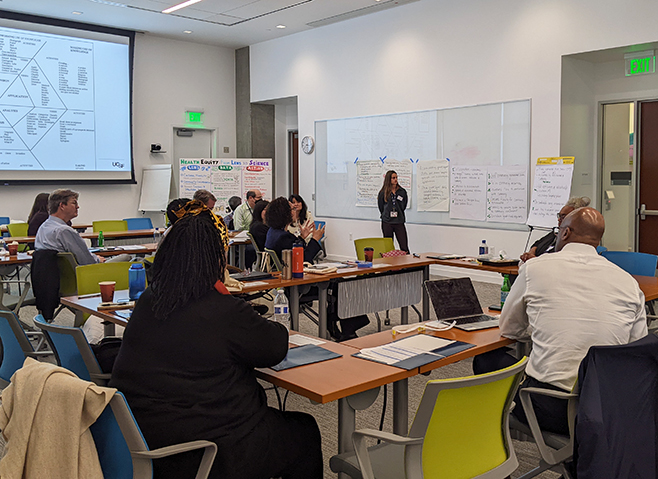UCSF’s Center for Pandemic Preparedness and Response hosted a symposium on January 25 titled Health Equity: From Lens to Science to inspire collective action to promote better health equity practices and perspectives among researchers in academic settings and with community partners.
While health equity is a broadly used term, its principles and strategies need more rigor and clarity. Thus, the symposium’s goal was to lay the foundation for creating a structured approach to embed health equity in research, starting from its foundational concepts to its broad application.
“Approaching health equity as a science will challenge us to use systematic and evidence-informed approaches to measure our impact toward eliminating inequities,” stated Kelly Taylor, PhD, MS, MPH, host and steering committee member for the event and an assistant professor of medicine with the Institute for Global Health Sciences.
The virtual morning session began with an introduction from Tung Nguyen, MD, the UCSF Associate Vice Chancellor for Research Inclusion, Diversity, Equity, and Anti-Racism, who emphasized the connection between health equity and socio-economic disparities. Nguyen was followed by keynote speaker Derek M. Griffith, PhD, professor at Georgetown University and a founding co-director of the Georgetown Racial Justice Institute.
Griffith spoke about the importance of understanding the conditions leading to health inequities and disparities, the limitations of equity and equality interventions, and the need to research with an anti-racism lens. He argued that it can be hard to prioritize equity when there aren’t clear goals and metrics, which set the stage for the panel discussions.
The first panel, Health Equity Lens and Community, featured a dynamic discussion among experts Zea Malawa, MD, MPH; Kim Rhoads, MD, MPH; Lisa Tealer; Erica Sosa, PhD; and moderator Kelly Taylor. The group emphasized the importance of community-driven research and the need for actionable outcomes beyond scientific publications. They discussed how researchers can impact policies that benefit communities, including following through on research outcomes and designing research studies backward, starting with the policies you want to change.
Multiple panelists discussed the importance of maintaining strong relationships with community partners when doing equity-focused research. Building relationships, following through, and ensuring resources reach those doing the work are crucial. Dr. Rhoads shared a tip for how to tell if your relationship with your community partner is more than transactional: “Do you know what your community partner does during the day when they’re not working on your project?”
The second panel, Health Equity Lens and Data, delved into the intricacies of health equity research design and the necessary competencies for professionals in this field. Rhonda BeLue, PhD, CMQ/OE; William Brown, PhD, DrPH, MA; Sophia Kostelanetz, MD; Paul Wesson, PhD; and moderator Kelly Taylor discussed research design, addressing biases in data, and understanding historical context when it comes to health equity research.
The panel underscored the complexity of health equity research design, emphasizing community engagement, addressing biases, and the continuous need for practical training and systemic changes to work toward health equity. Brown highlighted the need to address gaps created by technological advancements and misinformation. Wesson discussed the representation biases in AI and data sets and emphasized the importance of understanding the historical decisions that led to current disparities and inequities.
After the morning virtual session, 24 participants joined an afternoon in-person session to workshop measurable benchmarks for health equity science. Participants in this session – professionals in the health equity field — drafted core competencies for health equity scientists.
While participants discussed ideas, visual artist Silent James created live event illustrations.

The symposium brought together leaders and learners representing academia, health practitioners, policy experts, epidemiologists, data scientists, sponsors, thought leaders, community partners and other stakeholders working on health, public health and health equity. Together, they shared valuable insights and best practices for health-equity-focused researchers and began to build a framework of standards and competencies in health equity science. The insights gained from this symposium will contribute to shaping a more equitable and resilient health care landscape for all.
Please visit our Health Equity Science Symposium website to learn more about the symposium or watch the video recording.

